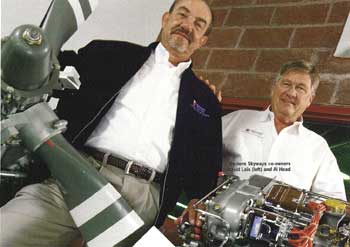Attitude at Altitude
Western Skyways takes off
Montrose business rebuilds aircraft engines
by Mike Harbour
 Despite the resurgence of commercial air travel, general aviation continues to grow at an incredible rate. That's good news for Western Skyways, a busy piston aircraft engine rebuilder in Montrose that recently began servicing the turbine engines used in thousands of business aircraft.
Despite the resurgence of commercial air travel, general aviation continues to grow at an incredible rate. That's good news for Western Skyways, a busy piston aircraft engine rebuilder in Montrose that recently began servicing the turbine engines used in thousands of business aircraft.
Aircraft manufacturers, based on figures from the General Aviation Manufacturers Association, shipped more than 4,000 general aviation - that is, noncommercial and nonmilitary - planes last year, almost 13 percent more than 2005. Industry billings rose 24 percent in 2006 to $18.8 billion, an all-time high. GAMA reported the industry will continue to expand at a rapid pace in 2007.
Tiny Montrose, with a population of about 13,000, might seem an unlikely place to profit from such a growth industry, especially since Grand Junction is considered the hub of the Western Slope. Montrose is often viewed as a vacation, not a business, destination. Yet the unassuming Uncompahgre Valley town suits Western Skyways just fine, according to co-owner David Leis.
"We do 40 to 50 engines a month now, and it doesn't matter where we're located." said Leis, a Brush native and vice president of sales. "We do engines that are in South America, that are in Australia, that are in Europe ... we could be located anywhere. It's nice that we're located in Colorado."
Formed when Leis and two former partners left West Star Aviation in Grand Junction in 1994, Western Skyways was pursued by airports in Texas, Oregon and Nebraska. Yet nothing could drag Leis and company president Al Head away from Montrose.
"I like the climate here; I was happy with the people we were getting," said Head, who previously owned an aircraft salvage company and moved from California to help fund the business. "Relocation is not easily done."
Airport managers treasure businesses such as Western Skyways. Many of its customers fly into the modern facility, which occupies almost 130,000 square feet of space. That means revenues from fuel, food and beverages, lodging and more. It also means bragging rights, as the 80-employee company - whose customers range from private owners to fleet operators _ enjoys a reputation quite unlike any other rebuilder in the business.
"As far as the piston side ... there's probably only one or two other shops that are even up to the volume that we do in the world," Leis said. "Most of these piston shops do 10 engines a month."
That's about the volume Western Skyways had when it began operations, but in the 12 years since, the company has gone from 89 engines shipped in 1994 to 420 shipped last year. Gross sales have leapt 700 percent from 1994 to 2006.
One of the rebuilder's best customers has been King Airelines, an air tour company that flies passengers over the Grand Canyon. Dave King, president, has purchased four to six engines annually for 1five years, and his flights in the hot and arid skies over Arizona are trying on equipment.
"Their engines absolutely hold up very well. Put it this way: We haven't really used other people out there because we were fully satisfied with their product and their service years ago," King says. "Any time we did
encounter a problem, they were very fair and very prompt, and dealt with it right away to our satisfaction. I don't think there's a need to shop around for another engine provider."
Employees' efforts have been rewarded with a profit-sharing plan that has been a key ingredient driving production. Western Skyways' success also enabled it last year to purchase the assets of a turbine repair and rebuild shop in Georgia. The equipment was relocated to a new, separate space at Montrose, and ASL Turbine's Tom Barry, a former senior vice president there, came along to the Western Slope to lead the new effort. Leis said the company is simply following the marketplace.
Fleet operators, such as customers Air Grand Canyon, an air tour company, and Telford Aviation, a large aircraft sales and service firm, once made up two-thirds of Western Skyway's business, with the balance held by private pilots or operators of only one or two aircraft. But Leis said that's changed. Now, the fleet trade makes up only a third of total sales.
That's where the turbine shop comes in because with such a facility, more of general aviation's business market can be reached, he said.
Another potential market is looming on the horizon: The VLJ, or Very Light Jet, is the latest aviation development, and hundreds of the diminutive Jet-powered aircraft may be taking to the sky over the next few years. Western Skyways might be interested but not just yet.
"Our plate's pretty full the way it is," Leis said. "We may change our minds 10 years from now." ~
 Despite the resurgence of commercial air travel, general aviation continues to grow at an incredible rate. That's good news for Western Skyways, a busy piston aircraft engine rebuilder in Montrose that recently began servicing the turbine engines used in thousands of business aircraft.
Despite the resurgence of commercial air travel, general aviation continues to grow at an incredible rate. That's good news for Western Skyways, a busy piston aircraft engine rebuilder in Montrose that recently began servicing the turbine engines used in thousands of business aircraft.